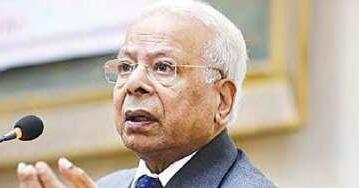
8 minute read
The SBP is controlling car imports
The SBP is controlling car imports. Here’s what that means
The State Bank of Pakistan (SBP) now oversees car imports and the automobile industry is not having it
Advertisement
By Daniyal Ahmad and Ghulam Abbas
All eyes in the automobile manufacturing industry are currently on the State Bank of Pakistan (SBP). Why? Because the fate of Pakistan’s automotive industry is currently hanging in the balance, and the central bank is holding the thread.
Nearly a month ago, the SBP released a circular addressed to banks, letting them know that they needed the SBP’s permission before performing transactions in dollars for the import of CKD (completely knocked down) units of cars. This meant that auto assemblers in the country will now need express permission from the central bank to be able to import and assemble cars.
The effects of this are far reaching. Senior industry executives had already been predicting that the upcoming year would see a serious rise in the prices of cars, particularly because of the dollar shooting up, and a fall in demand. The President of Automotive Division at Lucky Motors Corporation, Muhammad Faisal, has told Profit that a fall in sales by 40-50% compared to last year is expected, and other leading executives in the industry have expressed similar sentiment.
For the assemblers, the immediate worry is hammering out a quota system with the SBP, under which every manufacturer gets a certain slice of foreign exchange to import CKDs. However, there are already disagreements within auto manufacturers over what formula should be used to calculate this quota. For consumers, it means rising prices of cars, a serious dip in demand, and the end of ‘on’ premiums.
What exactly has happened
The crux of it is this - the government is trying to fight the current account deficit and has as a result tried to curtail the imports of cars into the country through the SBP. The SBP will now decide on a case to case basis how many dollars worth of a certain car can be imported into the country. So, for example, Lucky Motors will make a request through their bank to the SBP asking that they be allowed to import their car, the KIA Picanto. The SBP will then tell them how many KIA Picantos they can import.
To understand this completely, it is necessary to know that cars are imported in two forms. They are either imported already assembled or ‘completely-built-units’ (CBUs) or they are imported in parts and then assembled in Pakistan as ‘completely-knocked-down’ (CKD) units. The import of CBU units into Pakistan has already been banned under the incumbent government’s import ban on luxury items.
It is now the CKDs that are a bone of contention. The auto industry, already expecting lower demand because of the economic crisis and rising car prices, is aware of the realities. “The industry, as a whole, is cognisant of the macroeconomic environment. As such, forcing the government to rescind its ban on CBUs is not a major concern. However, the government should provide manufacturers with CKD import quotas instead of handling import approvals on a case-by-case basis,” says one senior automobile executive. Right now the SBP is micromanaging the import of all cars. They are telling Suzuki how many Swift CKDs they can import and how many Cultus CKDs they can import, while telling Toyota how many Yaris and Corolla CKDs they can individually import.
In response, the industry is essentially demanding that instead of dictating on a car-tocar basis, the SBP give assemblers a set amount that they can spend on importing CKDs, and let them determine themselves which model they want to import into the country. Of course, the issue here is that different auto manufacturers are in disagreement over what the best way to calculate this quota is. Some manufacturers, such as Lucky Motors, are in favour of the quota being calculated in accordance with how different car manufacturers performed in the previous year. This would be ideal for companies like KIA and Toyota, which had breakthrough years with new models of their cars. Other manufacturers would argue that it should be dependent on the capacity of the assembly line - such as Hyundai which doubled its capacity just last year.
Others still like Changan will also be against basing the quota off performance since they have only just introduced new models of their cars which they did not have in the market to compete with KIA, Toyota, Honda, and others before.
Muhammad Ali Tabba, Chairman Lucky Motors Corporation
The inevitable price hike
Let us just put this out there again - cars are about to get more expensive. With imports being tightly curtailed and supply low, the natural response will be for prices to go up. Revenue volumes are going down, so profit margins will have to be increased via a price hike. Assemblers will want to make up their costs and increase their profit margins, which will then mean fewer people will buy cars. This
Suneel Manj, Pakwheels founder

is the one certainty of the SBP’s measures - that demand will outstrip supply and will subsequently lead to some form of demand rationing by automobile companies and vendors. Since the SBP will monitor imports now, and the dollar is yet to settle on a price, for now many assemblers have stopped taking orders for their cars and are set to announce their new prices.
At the new prices, people will not buy cars as they were buying before, which is where Muhammad Faisal predicts this dip to be 40-50% of the 2021-22 volume. When this happens, ‘on’ prices will also go as cars will be readily available at showrooms and there will not really be a waiting period for many cars. Of course, in Pakistan there is also the possibility of this not happening since cars are considered an asset class that people ‘invest’ in rather than buy for their utility. There is also another angle to this. “The situation has flipped overnight for us. We have gone from working overtime to meet the unprecedented demand seen this year to experiencing bottlenecks in managing routine production. Furthermore, this increased volatility will negatively impact the future of the industry,” says Abdul Waheed Khan, DG of Pakistan Automotive Manufacturers Association (PAMA). “These measures may delay payments to foreign suppliers, who, in turn, may subsequently reduce engagement with their Pakistani counterparts going forward due to the higher moral hazard. It is pertinent that the SBP expedite CKD import approvals to mitigate industry losses.”
The second part, of course, is very unlikely to happen, since Pakistan is not an important enough market for companies to launch any kind of retaliatory ban or to approach their embassies in Pakistan to settle their debts. “Pakistan does not constitute enough demand amongst foreign companies and consumption for such severe measures,” explains Dr Ishrat Hussain.
Why is the SBP at odds with the auto industry?
In April this year, CKD imports registered at $1.6 billion. This was a 96.6% year-on-year increase from 2021. It came at a time when cash-strapped Pakistan needed to finance its Rs 25 billion a month fuel subsidy, and faced an external finance deficit of $35.068 billion for the upcoming fiscal year, per the IMF. On the 20th of May, the SBP released a circular addressed to all ‘authorised dealers in foreign exchange’ - meaning Pakistani banks. All international purchases for things such as imports are conducted in dollars, and any company importing a product needs to process payments through a dollar account in a bank. The SBP’s letter stated that banks now had to get ‘prior approval’ before initiating any payments in dollars. Among the products they listed - CKD units of cars.
Is there any other course of action?
The flipside of this is that the government is passing on a possible revenue stream through import duties.Muhammad Ali Tabba, in an interview, believes that increasing import duties is a better alternative to the import ban. “This will both assist the government in combating the current account deficit (CAD) and also raise revenue to meet the Rs 200 Billion surplus targeted in the budget for FY 2022-23,” he says “The ban only delays the inevitable. The global commodity super-cycle will lead to demand destruction. He cites reduced purchasing power and predicted price increases due to increased cost of production for manufacturers for his claim.”
Dr Ishrat Hussain voices similar concerns, who says “banned goods are those that are primarily consumed by the most well-off segments of Pakistan. Increasing the duties would allow the government to recoup lost forex.”
“Strictly in terms of the automobile sector, the ban on importing CKDs is counterproductive. The rupee’s devaluation with a steady flow of CKDs required for local assembly provides the opportunity for import substitution”
Muhammad Ali Tabba and Suneel Munj, like Ishrat, also critique of the import ban in the context of the automotive sector. Both, in their own capacity, cite the 2018-19 automotive market as an example of a rational automotive market. “Government intervention distorts the automotive sector, which was otherwise on the precipice of self-correction. He cites price reductions by Peugeot and KIA to some of their models as examples. The import ban, in his opinion, creates deadweight losses,” says Pakwheels founder Suneel Manj.
Conclusion
The true fallout of these measures on the macroeconomy and national exchequer, though expected, will only unfold within the coming weeks to months. The severity will vary. They may not be as bleak as the prospects painted by PAMA. However, the concerns may be indicative of the Government possibly forsaking better alternatives such as the ones highlighted by the aforementioned individuals. n
Dr Ishrat Hussain, economist









